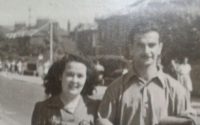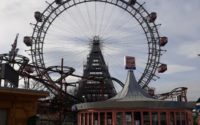A Nationality Conundrum
Throughout this the next blog, there are more photographs of Lviv I would like to share with you.
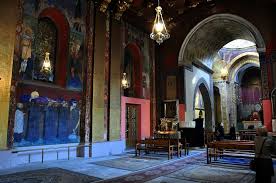
Arriving back from Lviv, on the 19th September 2014, the same day as the Scottish Independence Referendum returned a ‘No’ vote, I had a sense that things would never be the same. I had acquired a feel for Lviv; an innate sense of my predecessors living there; walking the streets they had once walked. It unlocked a box to many questions begging for answers. The history of the city, the terrible things that happened there between 1939-45. Imagine for a moment, the Bolsheviks with their warped interpretation of Marxism march in and commit atrocities against the Poles, and then two years later the Nazis with their murderous racial theories arrive and commit atrocities against the Jewish population, and to a slightly lesser extent the Poles. In 1944, the Bolsheviks are back, and between them and the Nazis; not forgetting locals who collaborated in these horrors; they have ethnically cleansed the city of Poles and exterminated a people whose crime was to be Jewish. I do not lay the blame on the Russian or German people as they too suffered under both ideologies.
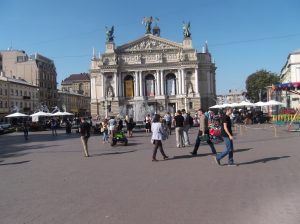
I explained all this to my mother, who at the time of my visit to Lviv was 91 years old and was thrilled to learn of my time there, knowing my trip was not entirely as a tourist. She asked questions about the city and what was my impression and a host of other things – things that perhaps my father had tried to eradicate from his memory. ‘Thanks for doing that’ she said at the end of my story. For her, I had the impression, I had brought closure. I made the visit just in time because shortly after that she began to deteriorate with the onset of dementia.
Where to next when the lines on the map have faded ? I pondered this for the remainder of that year. Before any impulsive dash to Wrocław or any other Polish city I needed to pause to find a strategy. All my recollections from the time in Lviv rolled out and again I wrestled with what, I would say, was ‘a nationality conundrum’. How should I define it now or did that really matter? My father was Polish by citizenship but not that much by blood. I would not be surprised, I thought, that at some later date I might discover I also had Jewish heritage. Poland before the war had a population of around 30 million, of which 3 million were Jewish giving me a 10% probability of having Jewish ancestry which would mean I really have a little of every denomination of the citizens of Lviv, Lvov, Lwów, Lemberg, Leopolis however you wish to name it. With Matthew Zajac’s book fresh in my memory I contacted him, really to bounce a couple of ideas because I remembered lines from his book about the mass deportations of Poles from what is now western Ukraine. I knew about his but the magnitude of the exile astounded me. I gave him a brief outline of the Moszoro side of my family and asked if he had any advice to offer on where I might search in Wroclaw for family documents or evidence. Matthew replied very promptly and despite his lengthy response, he personally had no experience of searching archives in Wrocław. If there are no birth records in Lviv where then?
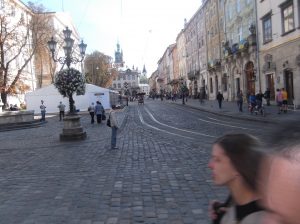
You people in Britain and Ireland who have done family research have received information either from a central data base or through parish records. You may even have extracts from old newspapers. For me it had to be a process of elimination and in the end I had to clutch at straws. Just before I quit the Galicia-Poland group, I found pictures of old Lviv linked to YouTube and a list of Archdiocese of Lviv birth records archived in Warsaw. Unaware of any parishes the only lead I had was Ihor Holyboroda’s suggestion that as my grandfather was an army officer, it was customary for their children to be christened in the Jesuit Cathedral. That was unsuccessful and on my return I wrote to the Catholic Archdiocese of Lviv as there were no records in Warsaw. The Warsaw records for Lviv and Przemyslany only covered the period until the end of the 19th century. However, the notes in the archive mention that records were indeed taken to the areas of the former German territories ceded to Poland after WW2. The Archdiocese, in its response to me suggested Kraków as there was a belief that Lviv birth records after 1920 were taken there. How much time, I wondered could I afford to spend looking through thousands of microfiches for my father’s birth certificate? To expand on the scope of my search let me explain two other pieces of correspondence I received, one in fact was before my visit to Lviv, from Bitte Sundin, a Swedish citizen. Her grandmother a Moszoro was deported to Wrocław around 1945. Bitte has researched her family for many years and she revealed a few, all of whom were born in the Lwów County (the nearest British equivalent of a regional area) including one Jakob Moszoro who had been vice-archbishop of the Armenian Cathedral in Lwów. In addition whilst corresponding with another, called Marian Moszoro, I learned that in his opinion, the Moszoro surnames are all related one way or another. Marian is an Argentinian national and there are, apparently others with the Moszoro surname living in Uruguay. So you see, I have quite a wide area to research. It also led to another question – did my grandparents have any siblings? I know that my grandmother did and it is likely that some of their grandchildren survived WW2. If so where are they?
Anecdotal evidence can be useful in any type of research, and it is best to visit the scene before drawing any conclusions. Family research is no different, except in my case I have a background of Scottish, Polish, German, Armenian and Hungarian (known so far) and also Protestant, Roman Catholic and Orthodox to contend with. A friend Anna Miszarz, knowing that my grandfather had died in Wałcz in Poland, suggested I contact the local museum there as it may know the cemetery in which he was interred. Anna spoke to the curator directly and I wrote to her. Although she knew little English and I, little Polish we communicated in German. The curator Beata Stankiewicz knew which cemetery and offered to locate it for me. I had made a breakthrough.
End
